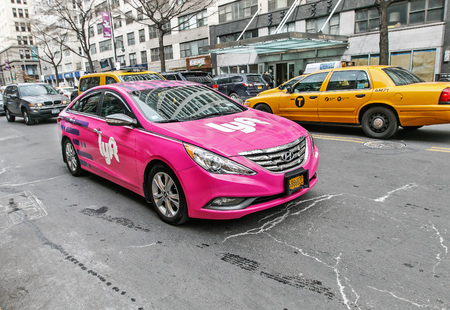Lyft IPO Follows a Foray into Finance Business
 Lyft had its IPO today in the same week it announced that it was offering a debit card to its drivers. The company announced the launch of “Lyft Driver Services,” a suite of services for Lyft drivers including Lyft Direct, a no-fee bank account and debit card. The Lyft Direct debit card will allow drivers to instantly access their earnings after each ride, according to a company statement on its Medium page. This is an extension of Express Pay, which allows drivers to cash out on their earnings right away, rather than wait for the pay cycle to end.
Lyft had its IPO today in the same week it announced that it was offering a debit card to its drivers. The company announced the launch of “Lyft Driver Services,” a suite of services for Lyft drivers including Lyft Direct, a no-fee bank account and debit card. The Lyft Direct debit card will allow drivers to instantly access their earnings after each ride, according to a company statement on its Medium page. This is an extension of Express Pay, which allows drivers to cash out on their earnings right away, rather than wait for the pay cycle to end.
“The traditional biweekly paycheck falls short of serving today’s workers, and the rising costs of maintaining a bank account disadvantage them further,” Lyft COO Jon McNeill explained in a statement. “Americans pay an average of $163/year in banking fees. Minimum balances are often greater than what many people can save, and most cash-back programs require an above-average credit score. We’re fixing that for our drivers.”
The Lyft Direct debit card has 4% cash-back on select restaurant purchases, 2% on gas, and 1% on groceries. Additionally, Lyft will offer its drivers a no-fee bank account with access to over 20,000 fee-free ATMs. Lyft is working with Oklahoma-based Stride Bank on this program. Stride Bank will manage all of the drivers’ bank accounts.
Last April, Uber released the Uber Visa debit card with Go Bank which also allows drivers to get paid instantly. Like the Lyft Direct debit card, the Uber debit card also gives users cash-back, like 3% on Exxon and Mobil gas, 2% on Walmart purchases and 8% on your Sprint bill.
Uber is no stranger to finance. In fact, the company once offered a product akin to an MCA where drivers were offered money up front in exchange for a percentage of their future fares, according to a deBanked story from 2016. That arrangement was made by Clearbanc. Uber also got into the leasing business with its leasing program, Xchange Leasing. But that was phased out beginning in 2017 due to myriad problems, including losses, an FTC lawsuit that dealt with misrepresenting the program, and an FTC complaint, according to a December 2018 post on The Simple Dollar, a personal finance website. The complaint accused Uber of connecting its drivers with subprime auto companies and dealers that provided interest rates significantly higher than industry averages.
So while Uber offers its drivers a debit card, it has backed away from other financing. With Lyft a step behind, will Lyft stop with this new debit card? Or perhaps learn from Uber’s mistakes and expand into the lending space?
The Lyft stock (NASDAQ: LYFT) started at $72 and closed its first day of trading at $78.29, up 8.7 percent.
Last modified: March 29, 2019Todd Stone was a reporter for deBanked.































